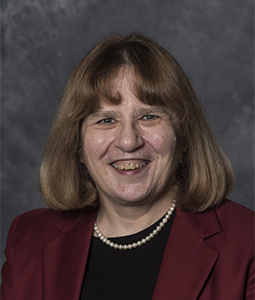School of Medicine Columbia
Faculty and Staff
Susan Lessner, Ph.D.
| Title: | Professor of Cell Biology and Anatomy |
| Department: | Cell Biology and Anatomy School of Medicine Columbia |
| Email: | susan.lessner@uscmed.sc.edu |
| Phone: | 803-216-3819 |
| Fax: | 803-216-3846 |
| Office: |
Cell Biology & Anatomy |
| Resources: | Lab Phone; 803-216-3837 |

Education
1983 Princeton University – Bachelors of Science in Engineering – Chemical Engineering
2000 Massachusetts Institute of Technology – Ph.D. – Chemical Engineering
2003 Emory University – Post Doctoral Fellow – Division of Cardiology
Research
Dr. Lessner's research interests center on the vascular biology and biomechanics of atherosclerosis, with an emphasis on intraplaque angiogenesis (new blood vessel growth) and mechanical failure (plaque rupture). Atherosclerotic plaque rupture is a leading cause of acute cardiovascular events such as heart attack and stroke. Evidence available to date suggests that plaque rupture results from an adverse interaction between biomechanical and biological factors. Research in our lab focuses on understanding both these types of factors and their interplay, in order to develop improved methods to reduce the incidence of plaque rupture and its harmful consequences. In terms of the biology of plaque rupture, we focus in particular on the role of intraplaque angiogenesis, or new blood vessel growth, as a destabilizing factor in plaque growth. We also collaborate with faculty in Mechanical Engineering to develop constitutive models of normal and diseased arterial tissue.
Publications
- W. O. Twal, S. C. Klatt, K. Harikrishnan, E. Gerges, M. A. Cooley, T. C. Trusk, B. Zhou, M. G. Gabr, T. Shazly, S. M. Lessner, R. Markwald, and W. S. Argraves, “Cellularized microcarriers as adhesive building blocks for fabrication of tubular tissue constructs,” Ann. Biomed. Eng., 42(7), 1470-1481 (2014), on-line ahead of print 8/14/13, doi:10.1007/s10439-013-0883-6.
- A. Sinha, A. Shaporev, N. Nosoudi, Y. Lei, A. Vertegel, S. Lessner, N. Vyavahare, “Nanoparticle targeting to diseased vasculature for imaging and therapy,” Nanomedicine, 10(5), 1003-1012 (2014), on-line ahead of print 2/22/14, doi:10.1016/j.nano.2014.02.002.
- P. Badel, S. Avril, M. A. Sutton, and S. M. Lessner, “Numerical simulation of arterial dissection during balloon angioplasty of atherosclerotic coronary arteries,” J. Biomech., 47, 878-889 (2014).
- Y. Wang, J. A. Johnson, F. G. Spinale, M. A. Sutton, and S. M. Lessner, "Quantitative Measurement of Dissection Resistance in Intimal and Medial Layers of Human Coronary Arteries," Exp. Mech., 54, 677–683 (2014), on-line ahead of print 12/5/13.
- H. R. Bateman, Q. Liang, D. Fan, V. Rodriguez, and S. M. Lessner, “Sparstolonin B inhibits pro-angiogenic functions and blocks cell cycle progression in endothelial cells,” PLoS ONE, 8(8), e70500 (2013). doi:10.1371/journal.pone.0070500.
- H. R. Bateman, Q. Liang, D. Fan, V. Rodriguez, and S. M. Lessner (2013) Sparstolonin B inhibits pro-angiogenic functions and blocks cell cycle progression in endothelial cells. PLOS ONE (in press)
- Avril S, Badel P, Gabr M, Sutton MA, Lessner SM (2013) Biomechanics of porcine renal arteries and role of axial stretch. J Biomech Eng 135:81007-81010
- Wang Y, Johnson JA, Fulp A, Sutton MA, Lessner SM (2013) Adhesive strength of atherosclerotic plaque in a mouse model depends on local collagen content and elastin fragmentation. J Biomech 46:716-72
- Y. Wang, J. Ning, J. A. Johnson, M. A. Sutton, and S. M. Lessner, “Development of a Quantitative Mechanical Test of Atherosclerotic Plaque Stability,” J. Biomech., 44(13), 2439-2445 (2011).
- J. Ning, V. G. Braxton, Y. Wang, M. A. Sutton, Y. Wang, and S. M. Lessner, “Speckle patterning of soft tissues for strain field measurement using digital image correlation: Preliminary quality assessment of patterns,” Microsc. Microanal., 17(1), 81-90 (2011).
- J. Ning, S. Xu, Y. Wang, S. M. Lessner, M. A. Sutton, K. Anderson, and J. E. Bischoff, “Deformation measurements and material property estimation of mouse carotid artery using a microstructure-based constitutive model,” J. Biomech. Eng., 132, 121010-1-13 (2010).
- Z. S. Galis and S. M. Lessner, “Will the real plaque vasculature please stand up? Why we need to distinguish the vasa plaquorum from the vasa vasorum,” Trends Cardiovasc. Med., 19(3), 87-94 (2009), PMID: 19679265.
- J. T. Propst, S. A. Fann, J. L. Franchini, S. M. Lessner, J. R. Rose, K. J. Hansen, L. Terracio, and M. J. Yost, “Focused in vivo Genetic Analysis of Implanted Engineered Myofascial Constructs,” J. Invest. Surgery, 22(1), 35-45 (2009), PMID: 19191156.
- X. Ke, M. A. Sutton, S. M. Lessner, and M. Yost, “Robust stereo vision and calibration methodology for accurate three-dimensional digital image correlation measurements on submerged objects,” J. Strain Anal. Eng. Design, 43(8), 689-704 (2008).
- S. Itoh, H. W. Kim, O. Nakagawa, K. Ozumi, S. M. Lessner, H. Aoki, K. Akram, R. D. McKinney, M. Ushio-Fukai, and T. Fukai, “Novel role of antioxidant-1 (atox1) as a copper-dependent transcription factor involved in cell proliferation,” J. Biol. Chem., 283(14), 9157-67 (2008), PMCID: 2431038.
- M. A. Sutton, X. Ke, S. M. Lessner, M. Goldbach, M. Yost, F. Zhao, and H. W. Schreier, “Strain Field Measurements on Mouse Carotid Arteries Using Microscopic Three-Dimensional Digital Image Correlation,” J. Biomed. Matl. Res. A,84(1), 178-90 (2008), PMID: 17607750.
- Z. S. Galis and S. M. Lessner, “Inflammation and Matrix Metalloproteinases,” In: The Vulnerable Atherosclerotic Plaque: Strategies for Diagnosis and Management, Virmani, R., Narula, J., Leon, M., and Willerson, J. T., eds. Oxford: Blackwell Publishing (2007).